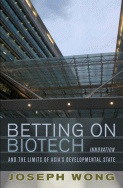
Betting on Biotech: Innovation and the Limits of Asia’s Developmental State
After World War II, several late-developing countries registered astonishingly high growth rates under strong state direction, making use of smart investment strategies, turnkey factories, and reverse-engineering, and taking advantage of the postwar global economic boom. Among these economic miracles were postwar Japan and, in the 1960s and 1970s, the so-called Asian Tigers—Singapore, South Korea, and Taiwan—whose experiences epitomized the analytic category of the “developmental state.”
In Betting on Biotech, Joseph Wong examines the emerging biotechnology sector in each of these three industrial dynamos. They have invested billions of dollars in biotech industries since the 1990s, but commercial blockbusters and commensurate profits have not followed. Industrial upgrading at the cutting edge of technological innovation is vastly different from the dynamics of earlier practices in established industries.
The profound uncertainties of life-science-based industries such as biotech have forced these nations to confront a new logic of industry development, one in which past strategies of picking and making winners have given way to a new strategy of throwing resources at what remain very long shots. Betting on Biotech illuminates a new political economy of industrial technology innovation in places where one would reasonably expect tremendous potential—yet where billion-dollar bets in biotech continue to teeter on the brink of spectacular failure.